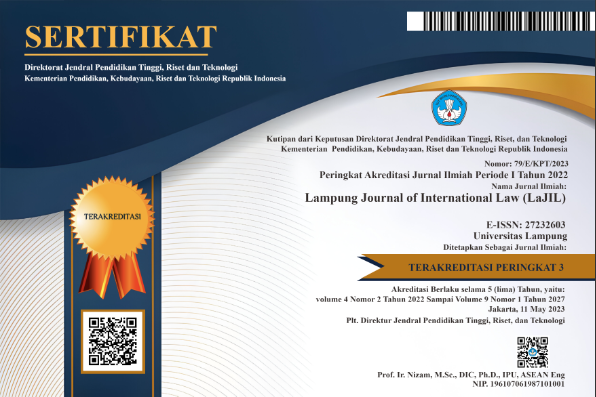Non-Claimant States’ Perspectives on the South China Sea Dispute
DOI:
https://doi.org/10.25041/lajil.v5i1.2717Abstract
The problem in the South China Sea is becoming increasingly complex because other parties also have strong regional interests. The other party was later called a non-claimant state in the South China Sea area. Non-claimant states ensure that international law of the sea is enforced in any part of the sea on the planet to guarantee safety and freedom to transport commodities with high economic value. These non-claimant states generally oppose China's actions that do not comply with the agreed UNCLOS. This juridical normative research presents the legal basis for the actions of non-claimant states in the South China Sea region based on relevant literature. This study describes the basis of international law and the interests and policies of non-claimant states such as Indonesia, the USA, the UK, Australia, the EU, Japan, and India over the South China Sea region.
Keywords:
UNCLOS, South China Sea Dispute, Non-Claimant States PerspectivesReferences
Atriandi, Ristian Supriyanto, Out of Its Comfort Zone: Indonesia and the South China Sea. Asia Policy, Number 21. (2016) pp. 21-28.
Aziz, Saidatul Nadia Abd, and Salawati Mat Basir. “South China Sea: ASEAN Mechanism on Maritime Disputes and the Rise of Indo-Pacific Region.” The Journal of Territorial and Maritime Studies 9, no. 2 (2022): pp. 65–82.
Bronson, Percival, “U.S. Perspectives on the South China Sea,” S. Rajaratnam School of International Studies Report (2014).
Buszynski, Leszek and Thanh, Do Hai, “The South China Sea: From a Regional Maritime Dispute to Geo-Strategic Competition.” Routledge. (2020).
Clare, Angela. ASEAN and the South China Sea, Australia Foreign Affairs, Defence and Security. (2021).
Cruz, Renato De Castro, China and Japan in maritime Southeast Asia: extending their geo-strategic rivalry by competing for friends. Philippine Political Science Journal (2013).
Dieter-Hans, Evers, “Understanding the South China Sea: An Explorative Cultural Analysis.” Journal of Asia-Pacific Studies. (2014).
Duchâtel, Mathieu, “Europe and Maritime Security in the South China Sea: Beyond Principled Statements?,” Asia Policy 21, no. 1 (2016), pp. 54–58.
Granados, Ulises, “India’s Approaches to the South China Sea: Priorities and Balances.” Australian National University. (2018).
Hayton, Bill. How to Solve the South China Sea Disputes ISEAS – Yusof Ishak Institute. Issue No. 25 (2022).
_________, The Invention of China, Yale University Press New Haven and London. (2020)
Koda, Yoji, “Japan’s Perceptions of and Interests in the South China Sea,” Asia Policy 21, no. 1 (2016), pp. 29–35.
_________, “Japan’s Perspectives on U.S. Policy toward the South China Sea,” Perspectives on the South China Sea: Diplomatic, Legal, and Security Dimensions of the Dispute, no. September (2014), pp. 82–95.
Ma, Tiffany and Wills, Michael, “Raising the Stakes: The Interests of Non-Claimant States in the South China Sea Disputes,” Asia Policy 21, no. 1 (2016), pp. 2–5.
McDevitt, “The South China Sea: Assessing U.S. Policy and Options for the Future.” A CNA Occasional Paper. 2014. pp. 1-92.
Mclaughlin, “U.S. Strategy in the South China Sea Perspective.” American Security Project. (2020).
Medcalf, Rory “Rules, Balance, and Lifelines: An Australian Perspective on the South China Sea,” Asia Policy 21, no. 1 (2016), pp. 6–13.
Raymond, Mark, and David A. Welch. "What’s Really Going On in the South China Sea?" SAGE: Journal of Current Southeast Asian Affairs, Vol. 41(2) (2022): pp. 214–239.
Renato Cruz De Castro, “China and Japan in Maritime Southeast Asia: Extending Their Geo-Strategic Rivalry by Competing for Friends,” Philippine Political Science Journal: Taylor & Francis, (2013).
Singh, Abhijit, “India’s Strategic Stakes in the South China Sea,” Asia Policy 21, no. 1 (2016), pp. 14–20.
Storey, Ian “Britain , Brexit , and the South China Sea Disputes,” Maritime Awareness Project Analysis (2020).
U.S.-China Strategic Competition in South and East China Seas: Background and Issues for Congress”, Congressional Research Service, October 6, 2021. https://sgp.fas.org/crs/row/R42784.pdf.
United States Department of State Bureau of Oceans and International Environmental and Scientific Affairs, Limits in the Seas No. 141, Indonesia Archipelagic And Other Maritime Claims And Boundaries. Office of Ocean and Polar Affairs Bureau of Oceans and International Environmental and Scientific Affairs U.S. Department of State. (2014).
Downloads
Downloads
Published
How to Cite
Issue
Section
Copyright
Copyright (c) 2023 by the Auhtor(s) Published by Development Centre Research of Law and Scientific Publication on behalf of the Faculty of Law, Universitas Lampung
License

This work is licensed under a Creative Commons Attribution-ShareAlike 4.0 International License.







